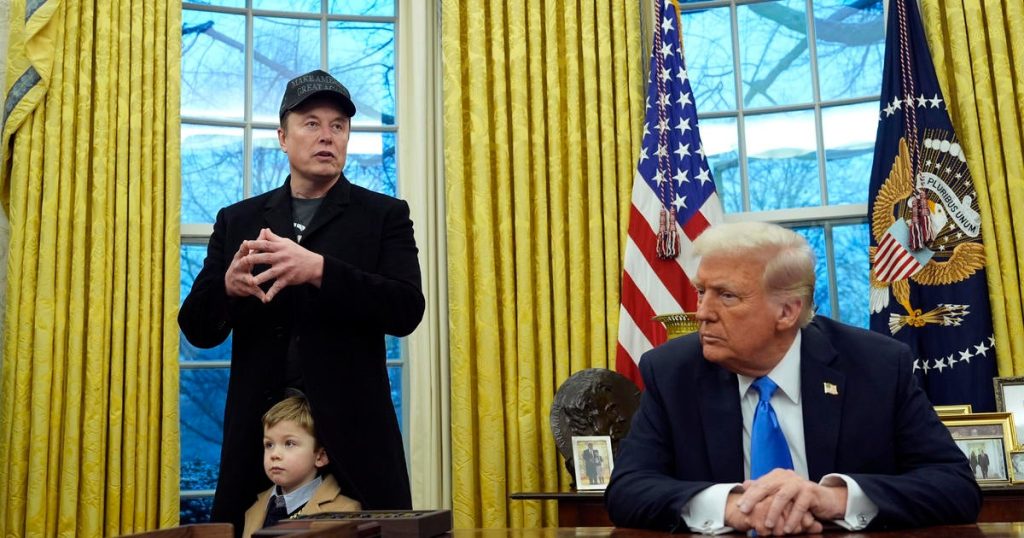A New Era of Government Reform: Elon Musk and President Trump’s Vision
The Oval Office recently witnessed a significant moment in the Trump administration’s push for government reform as Elon Musk, the world’s wealthiest man, stood alongside President Trump to defend the Department of Government Efficiency’s (DOGE) efforts to drastically reduce federal spending and streamline the workforce. Musk, who has been granted broad authority by President Trump to overhaul the executive branch, emphasized that the American people have voted for major change, and the administration is committed to delivering on that promise. With his young son by his side, Musk addressed the press, asserting that the government’s current trajectory is in line with the electorate’s demand for significant reform. "The people voted for major government reform, and that’s what the people are going to get," Musk declared. "They’re going to get what they voted for."
The Executive Order and the Path to a Leaner Government
President Trump underscored his support for Musk’s efforts by signing an executive order that directs federal agency heads to coordinate with DOGE in shrinking the federal workforce and limiting hiring to essential positions. A White House fact sheet highlighted the order’s intent, stating that agencies must work closely with DOGE to reduce the size of the federal government. Musk, who has been a vocal advocate for fiscal constraint, argued that it is "essential" for the government to reduce its spending, particularly as interest on the national debt continues to grow as a significant portion of the federal budget. The Trump administration and DOGE have taken a systematic approach, reviewing each agency to identify areas where workforces and programs can be slashed. This aggressive downsizing effort, however, has not been without its challenges.
Legal Battles and Democratic Opposition
The rapid pace of government downsizing and the freezing of various federal programs have drawn sharp criticism from Democrats, who argue that these actions are illegal. The administration’s efforts have been met with widespread legal opposition, with dozens of lawsuits challenging the constitutionality of Musk and his team dismantling agencies and programs established by Congress. Courts have blocked several of the administration’s actions, including barring Musk’s team from accessing sensitive Treasury Department data and pausing a deadline for "deferred resignations" offered to federal workers. These legal hurdles highlight the contentious nature of the reforms and the ongoing debate about the limits of executive authority.
Accountability, Transparency, and Conflicts of Interest
Musk, who has faced questions about potential conflicts of interest given his extensive business dealings with the federal government, maintained that federal workers need to be held accountable. He referred to the bureaucracy as an "unelected" fourth branch of government, implying that it operates with too much autonomy and too little oversight. When asked about his own financial disclosure report, which will remain confidential, Musk deflected the question but pointed to the DOGE website as a source of transparency. He invited the public to scrutinize whether his actions at DOGE might benefit his companies, stating, "You can see whether I’m doing something that’s benefiting one of my companies or not. It’s totally obvious." Musk, whose companies have billions of dollars in contracts with the federal government, acknowledged that he would be under constant scrutiny and expressed confidence that he would not be able to "get away with anything untoward."
The Risk of a Constitutional Crisis
The legal challenges and the administration’s response to them have raised concerns about a potential constitutional crisis. Vice President JD Vance and other Trump allies have argued that the courts have no role in constraining the executive branch’s legitimate authority, a stance that has alarmed Democrats. When asked if he would abide by court decisions limiting his administration’s actions, President Trump replied, "Well, I always abide by the courts, and then I have to appeal it." This response, while seemingly compliant, has done little to alleviate fears that the administration might defy a court order in the future. Musk, for his part, acknowledged that mistakes could be made in the rush to reform the government but expressed confidence in the ability to correct errors quickly. He even referenced a false claim he had made about the U.S. planning to send millions of dollars’ worth of condoms to Gaza, stating, "We are moving fast, so we will make mistakes, but we will fix the mistakes very quickly."
The Debate Over Speed and Accountability in Government Reform
The partnership between President Trump and Elon Musk has brought a new level of urgency and ambition to the effort to reform the federal government. While supporters argue that drastic measures are needed to address the nation’s fiscal challenges and restore accountability, critics warn that the administration’s approach risks undermining the rule of law and the constitutional balance of power. As the legal battles continue and the reforms unfold, one thing is clear: the Trump administration, with Musk at the helm of DOGE, is charting a controversial and potentially transformative course for the federal government. Whether this vision of a leaner, more efficient government will ultimately succeed—and at what cost—remains to be seen.












